#also doesnt help that i barely do social media anymore and dont watch people to get to know them to pick out who i want to “meet”
Text
talking to new people I just met is way too hard and exhausting. I prefer to follow each other online for a while first and watch them, get to know them from the side, develop a script/manual of how to talk to or interact with them, and already know the essentials in order to skip the small talk phase. going straight from stranger to trying to talk to someone is overwhelming and difficult. I can barely function in conversation without having a script for someone. but making a script for people takes SO LONG. so it can also become exhausting, especially if you are missing essential pieces that person doesn't easily give you.
#does this make sense? not a physical script but like a mental note of how someone works and how you should work with the#m#and before someone once again tells me i shouldnt do tbis and should “be myself” why dont you find my user manual on how to do that#i dont think i came with one. so this is all i can do or i wont interact with anyone ever#lee rambles#is this a lee thing or an autistic thing#autistic#autism#actually autistic#tag anyway because idk#also doesnt help that i barely do social media anymore and dont watch people to get to know them to pick out who i want to “meet”
6 notes
·
View notes
Text
Lets talk about Korra (again)
i already made this analysis, and it was well received but i dont know, i wanna do it again. Why not right? My english is better now than was when i made that analysis so i think this one will be better written
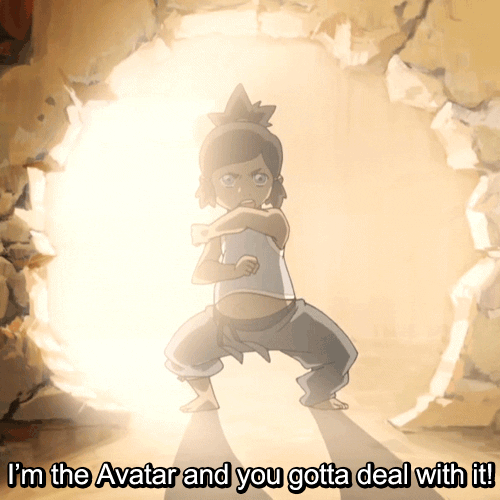
What a way to introduce a protagonist. This line and this scene tell us everything we need to know about Korra at that time and everything she knew about herself.
In book one Korra is a 17′s old teenager who have no idea how the world, how life is outside the training center she grew up in and had been locked up since ever. So she is not only naive but have lack of social skills
Oh, and not everyone who lack’s social skills will act like Zuko and Azula okay? Korra can be confident, expressive and outgoing and still have problems when it comes to social skills.One thing dont exclude the other.
“I’m the Avatar and you gotta deal with it” did you guys notice that only for that line we can see the entire opposite on how she treat her role as avatar in comparisson with Aang? And im not here to judge because is two very different contexts.
As far as we know, Korra grew up without friends or romantic partners. Of course, she had her training partners but i believe that they are just that.
So her entarely perception of herself was around her duty as Avatar, she didnt have personal life, she barely was Korra...She was The avatar and thats that.
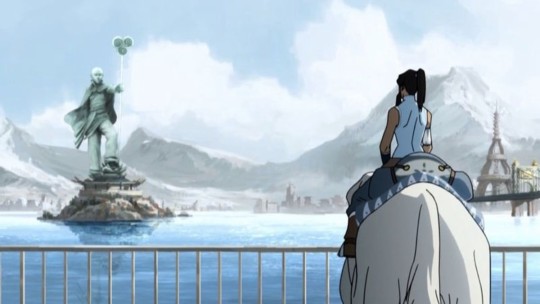
So she came to Republic City, it was a mess.
Its funny to see that she have no touch when it comes to simply talk to people, i guess when you grew up away from society, this happens. And yes, she is cocky and had to learn that people arent there to somewhat please her, and she learned that quicky.
Thats why the Pro Bending was important for her character, not only for training but also as means of socilization.
Now lets talk about the villains: Amon and Tarrlok
The two of them represents two differents threats to Korra. Amon represents a threat to her duty as Avatar while Tarrlok represents a threat to Korra as a person.
In episode 4 we have what i still thinks is the darker episode from TLOK. In this episode Amon ambushes Korra in the final moments... Even knowing that they did their best to make Amon’s power and control be non-sexualized as possible still...He have her down on her knews, totally helpless and he even invades Korra’s personal space by touching in her face forcing her to look at him. He didn't have to sexually touch her to violate her.
And right after, the fear in Tenzin voice when asking what happened after seeing her laying in the ground like that, and how Korra is sobing in his arms teeling him how powerless and helpless she felt. I mean...Oh, and she keeps terryfied by him until he takes her bending.
Tarrlok in the other hand doesnt do much different from his brother and started to harass Korra because he cant take ‘no’ as a answer when Korra didnt wanted to join his task force.
Whats interesting is that if it wasnt for Tarrlok harassement and maniputation, Korra wouldnt have joined his task force and wouldnt have confronted Amon and wouldn't have gone through that terrible encounter.
The thing is that Korra is caught right in the middle of a politcal power dispute over the city, something that she for sure wasnt prepare for it. And both Amon and Tarrlok woud hurt or kill her without think twice about it if that means gain power. And that was exacly what happened
Tarrlok tried to manipulate her and keep her on leash where he could, and when his tatics didnt worked anymore he alreay had a plan B. Yes that whole metal box in that cabin in the middle of nowhere was made especifically for her and maybe Tenzin if he also get in his way.
In the end Korra lost the physical battle against both but won the ethical battle also against both. She was the responsable for expose both of them as corrupted and hypocrites. But at what price? Amon was able to remove the bends of the Avatar. And without them, how could she be the Avatar?
Remember that her entirely conception of herself was built around her duty as Avatar, be the avatar. After all, everything she was, everything she'd trained so hard for, had been destroyed in minutes. Thats why i still strongly believe that she was thinking about killing herself at the end, nobodys goes all sad and crying to in front of a clifft without thinking about jumping from it.
But she, i think given up the idea and just sit and started to crying when Aang appeared and help her, giving her bendings back in one of the best scenes of the show. So after have everything solve and still managed to get the boy she was in love with, things where great and she “move on”
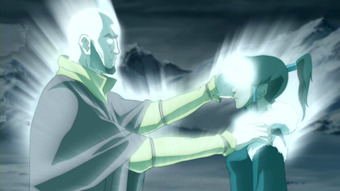
In that first half, Korra is unbearable. Everything she learned in Book 1 how to be more mature, less spoiled and all, was thrown in the trash and she was the same "child" of the book one only worse.
Until I stopped and realized that I was also unbearable and childish like this when I had my bad phases of anxiety and depression, as defense mechanism and keep people away. Returning to Korra, and if this way of acting of her was nothing more than this defense mechanism?
Because guess what, i dont think she “move on” from all that happened in Book One that fast, and for add more drama she discovered that was her father idea of keeping her locked up training in that training center we saw in book one and not traveling like avatars before her. No wonder she felt betrayed. And for adding even more drama, people still keep treating her like child, so she was despered for some validation. Something that she found in her uncles arms but she was betrayed by him after.
In the end, Korra again goes through a traumatic experience when she has her connection with past lives destroyed. We see how it affected her when she apologizes to Tenzin, through tears. And Tenzin, as the excellent master he is, tries to motivate her to face Vaatu again (now merged with Unalaq, her uncle) and again she saves the day even after go throught a traumatic event
In the final moments, we see the innocent decision to reconnect the world of spirits and the world of men. And we also see Korra and Mako permanently end their turbulent relationship.
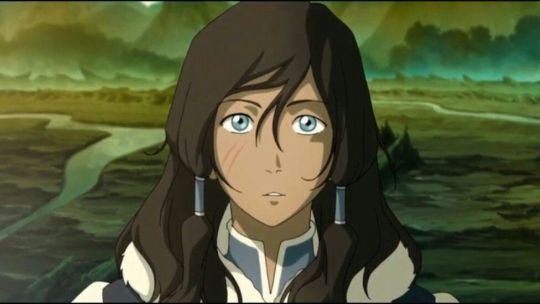
Book 3 begins in a more mature, we see all the characters being presented in a more mature way and it seems that Korra now has overcome everything that has passed. We have the relationship between Korra and Asami deepening as well
In Book 3, called "Change" we have a great sacrifice from Korra. Her life goes down a notch when she decides to save the new airbenders from Zaheer and the Red Lotus, the only villain until now that really threat her life since their sole goal was to kill the avatar.
Korra won again but this time victory costed way too much. Yes she save the day again but now she was physically and psychologically defeated. It was too much, she broke.
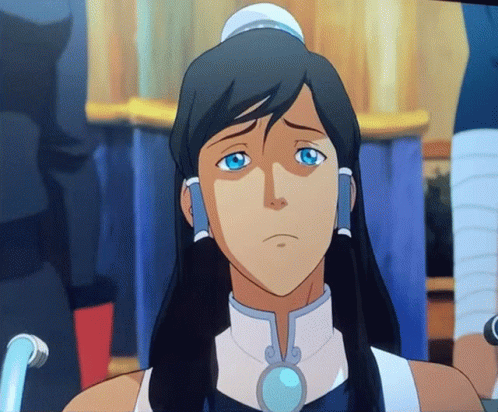
Book 4 begins and we only saw Korra in the final minutes and she is unrecognizable. We see that, once proud and courageous avatar, in someone depressed and cowerd. We never have saw Korra like that, even when she was afraid of Amon she wasnt like that.
Korra is afraid of being the Avatar again and her fight against PTSD is still one of the most sensitive, responsable and honest representation of Mentall Issues that i saw, and it was before this subject gain more space on media. It was before people started to give attention to this
I also think that she was having flashs from her other fights and not only the one against Zaheer.
Another thing I think is worth mention is that Korra took 3 years to feel safer and re-embrace her duties as Avatar. It was not 3 weeks or 3 months, it was 3 years. And anyone who suffers from some mental illness knows very well the stigma that is, the fight that is, because everyone wants you to be well faster as possible when the truth is that many times you spend years fighting against this. And this is a pressure that falls on you.Imagine, seeing all your friends moving forward while you continue "stock in the same place"?
Only after Korra confronts Zaheer, I think that was a way to show her coping with the trauma, she improves to the point of returning to be the great Avatar we know. I personally still struggles with this scene because put the victim in front of her agressor may not be the best idea but i understand that she needed to see that he was just a man and not the invencible monster her mind was telling her
One of the lines that stuck with me the most was in the TLOK version of the ember island players, the one that made a recap of the show before the finale. When Korra said “I was so naive” just before we watch her narration of her journey, we can feel pain, sadness and strenght. Janet was amazing in the way the delivered this line.
And this fucking quote i saw here on tumblr still is the goat: “The Last Airbender is a story of a boy who becomes a god. The Legend of Korra is the story of a goddess who becomes a girl "
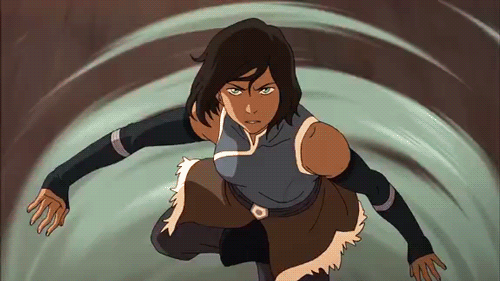
And I still get really pissed when someone comes to talk shit about Korra because she is such an incredible heroine and her journey is also so incredible.
The story of how life can be hard and unfair, how it can hurt and paralyze, but there is always a reason to move on. We should always move on.
Korra is definitely not weak, quite the opposite, she is one of the if not the strongest heroine I have ever seen. Korra inspires overcoming
#korrasami#avatar korra#asami sato#mako#tenzin#bolin#lin beifong#su beifong#kuvira#zaheer#amon#unalaq#tarrlok#the legendd of korra#legend of korra#tlok#lets talk about#avatar
184 notes
·
View notes
Text
i need to make a post abt this bcus 1) i dont want anyone to think im just ignoring kayvan and mark’s antiblackness & racism and 2) writing out my thoughts/feelings helps me to detangle them when theyre in a mess like this.
also please dont reblog this, it’s literally just my personal internal thoughts & feelings. this isnt an activism essay, im not arguing my opinions or trying to tell other people how to feel/act.
ive been trying very hard to process my thoughts/feelings & to carefully seperate actor from character in my head and like. i think im accidentally strangling my hyperfixation to death bcus im accidentally using my main coping skill which is “oh, im having emotions? well not anymore” and i dont know HOW to not do that!!!! that shit has killed my hyperfixations so quickly before and i dont want this one to die but i also dont want to just ignore the problem.
one might be able to tell but i’ve been focusing more on nadja & laszlo & guillermo than nandor & colin robinson and it was at first an entirely subconscious thing up until i thought “oh i should draw nandor from reference so i can get a better idea of his features” and then immediately dismissed it bcus then i’d have to look at kayvan’s face.
i didnt reblog the initial post about it because as important as it is to have visual evidence of kayvan’s antiblackness, if i as a white person could barely stomach seeing those pictures then i cant imagine how a black person would feel seeing them just randomly on their social media feed.
i cant even look at kayvan without seeing the picture of him in blackface. its fully affecting my ability to enjoy watching the show and i wish it wasnt but its just... so hard for me to cope in any other way than full disassociation and avoidance of the source of bad emotions. this is literally my trauma responses working against me again and i dont know how to make them stop.
it doesnt help that im dissociating half the time anyways. just makes it easier for me to turn off my emotions, but turning off my emotions is counter-productive!!!! i need to care about these things and feel anger/disgust/compassion/sympathy when i see racism or else im just going to end up even more complacent than i inherently am or worse. because its always so very easy for white people to let themselves be swept into participating in racism/antiblackness so we can reap the benefits.
i just need to find some way alternate way to cope that isnt anger (bcus i’ll burn out so fast) or full dissociation/avoidance. its killing me like actually bcus im deep in the avoidance mindset so if im feeling a negative emotion where the source of it is ME....... one can probably imagine my instinctual reactions to randomly remembering something embarrassing i did years ago. its not fun!!!
but i haven’t had a therapist in almost 2 years bcus i’m always fucking trapped in a cycle thats like “has problems, need to make appointment > must call on phone > gets intense anxiety about calling on phone > starts to avoid & ignore the source of anxiety including entire subject of why i must call on phone > forget about/normalize my problems > problems continue to get worse > need to make appointment > repeat.”
so like. if anyone has any links to articles or advice from their own therapists/psychiatrists to share with me about this kinda thing, i’d be forever grateful.
but even then it doesnt help with my current situation vis a vis kayvan and mark’s antiblackness. ive been able to consume/interact with stories & media made by racists before in a way that doesnt support them and doesnt ignore their racism but also is enjoyable. for example, i was hyperfixated on HP for months and half of the fun of that was being able to rip apart the really bad writing to expose the baked-in bigotry and then challenge myself to come up with better ideas.
but its very different with wwdits because while theres most definitely some bigotry which is bound to happen when you have a lot of different writers & also a shit ton of improv from the actors (not talking about the satire bcus its pretty obvious when theyre being satirical vs not), its not... to the same level. like fucking at all.
the show is great. it’s genuinely, actually progressive and funny and well-made and its so obvious every single person involved in it creatively has a great deal of passion for the show. there’s so much effort put into it to make sure any representations of minorities or oppressed groups are accurate and positive and not made into unoriginal & boring punch-down jokes while also still remaining a funny ass fucking show.
i guess my main issue is that the way this show is made makes it extremely difficult to separate character from actor. not just because they have the same faces/voices, but also just that they formed the characters around the actors themselves and the actors are encouraged to add onto their characters through improv and such. it wouldnt be the same show without those specific actors.
ive been talking to my mom about it and they suggested that i should watch other things kayvan has acted in just to help my brain separate nandor from him and tbh. that seems like a really good idea. maybe i could watch cruella finally, ive heard its not all that bad of a movie... hmmm....
thankfully mark has like no social media presence so its not all that hard to separate him from colin robinson. theyre two different people to me entirely.
i just hope when the fan pressure for accountability finally gets to kayvan that he doesnt double down again. like i really hope he’s privately realized how much harm he does and that he eventually publicly holds himself accountable.
sigh. yeah making this post was a good idea, i feel way better now that i have my thoughts written down instead of all jumbled together in my head.
#personal post#dnt rb//#krav talks#also im serious about the advice on how to cope with avoidance.#it is...... debilitating.
14 notes
·
View notes
Text
Living Online
Online language deconstructs certain social expectations of formality in our use of ‘grammatically correct’ English. The words and phrases used on social networking platforms, or just on devices in general, embody the casualness of grammar which has been developing over the past century in correlation with the inventions of the technological boom. Nowadays, owning a mobile phone is merely an expectation due to the generational progression of constant communication and the pressures of updating content on applications throughout the day. The normality of posting a story of every meal you get served in a restaurant or every time you head to the gym, engages the assumption of a forward facing generation who expect an applaud for leading a very normal life. In reality, the ever expanding media richness of the internet has lead to many of us wanting to live and document our lives online.

Imagine taking a spontaneous trip to London to have dinner up The Shard, would be lovely wouldn’t it? BUT, did it really happen if you didn’t post a photo to your Instagram story or upload your feed with a photo of the view underneath the tagged location? Every occasion in this generation of serial swipers and double tappers require Snapchats, Instagram and Facebook check-ins in order for the day to have been fully experienced.
Our phones are gradually becoming an extra limb, an attachment to our hands that erupts panic through our bodies if it’s not arms reach away at all times. The cost of this specific human mutation, has caused a nation to suffer through the declination of face to face contact. It is no secret that England is the 8th laziest country in the world, with 63.3% of the nation completely inactive, but our reliance on our phones are slowly progressing much more than the novelty of a phone call or a quick text. We now abuse the inventions of applications to build and maintain the foundations of many of our real life relationships that are otherwise abandoned in face to face situations. With apps abilities ranging from tagging people in funny videos on Facebook to making quick cash by selling clothes on Depop, to now actually sourcing romantic relationships on platforms like Tinder, there really is something for everyone.
As we build our profiles on apps accessible to us by all devices we, as users, are granted the ability to engage with Computer Mediated Communications (CMC). In accessing CMC, the opportunities to interact with long distance family or form relationships with online friends, enhance the attraction towards online interactions over face to face interactions due to its easiness in the little effort it requires. Social networking platforms provide us with the protection of certain situations which, in real life, would cause hesitation or conflict if gone about in the wrong way. Through being on Facebook or Instagram etc, allows us to portray the best version of ourselves by exercising the ability to control and manipulate any personal information and content visual to others and with much little transaction costs. Online profiles only gage the persona we aspire to liken ourselves to, in other words, it’s our most favourite version of ourselves we wish to ascertain - all the time.
Do you look better with a tan? Stick a filter on it.
Always wished your legs looked longer in that bikini pic? Photoshop!
Don’t like that friend anymore but think the selfie captures your best angle? Thank god for crop.
See how easy it is to alter someone else’s perspective of you? And it doesn’t stop there.
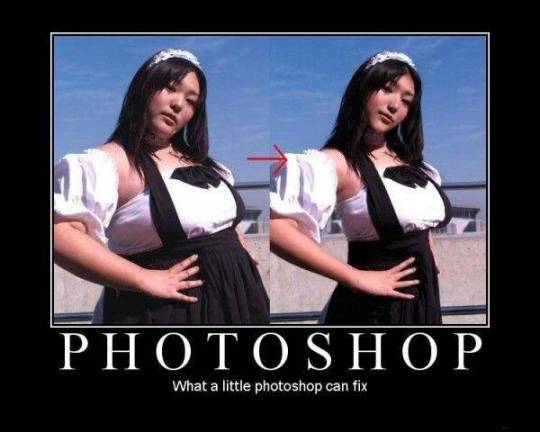
Our online language, believe it or not, is one of the most powerful tools of expression in creating our online footprint. Instagram’s and profile picture updates might not gage that much of our personality due to the absence of textuality attached to the post. However, on applications with the main feature being communication, our online language starts to form its own natural quirk. It would be easy to explain that all the emotions and feelings inside our heads, that are often the main reason we feel so desperate to share something to our social media pages, are filtered and controlled by little people in our brains which makes our actions pre-justified and reasonable. But unfortunately, this is not the case.
If you’ve never seen the Walt Disney movie ‘Inside Out’ I would highly recommend it in order to explore a simplified representation of impulse reactions. The film features 5 personifications representing Riley's (an 11 year old girl) basic emotions; Joy, Sadness, Anger, Fear and Disgust. They all function in her headquarters with the emotions influencing her choices and reactions to life events throughout her growing up period. The emotions use a control console which allows them to influence Riley accordingly, depending on the morality of the situation and potential consequences. This concept of human incapability of controlling their own actions is an enlightening approach to the modernised world of online communication.
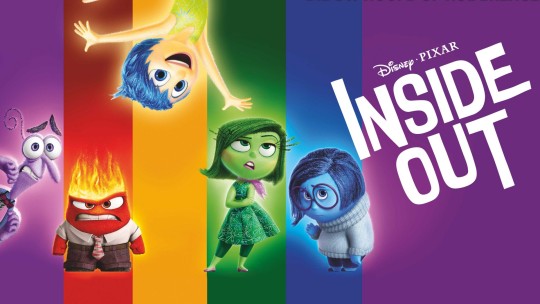
The idea of internal characters influencing one persons reactions, can be reflected in the concept of social interaction whereby a lot of us will use social media to gage opinions from others. Generally, if we are faced with challenging online conversations, it is likely that the process of screenshotting and forwarding will occur. It is no secret that nowadays, our camera rolls contain mostly past conversations or arguments sent to friends to seek help or advice in how best to respond to a problematic message. And, even though, generally, it’s always the same two people most active in the group chat who are most likely to give you the synchronous response of feedback and moral support you so desired, the few onlookers - more suitably referable as ‘the overhearers’ that barely speak - gain all the drama without having to put any effort in. You know the ones, sitting on the group chat and watching all the messages roll in whilst also pretending to have lost the ability to reply!!! The fact that people now prefer to not only communicate online, but now also to turn to others to reply to messages meant for only the receiver, prevails online interaction as a manipulation of reality. Because messages, despite being sent to one person, no longer embody instant messaging but are now asynchronous chats due to their drafting, editing and altering by many, many more people. Also, who’s to determine the tone of a message anyway? Due to the inconclusive interpretation of the true intentions of a message, we are left alone to determine how to provide our response.
Replying to messages can be a lengthy process. We determine suitable replies independently in order to maintain relationships with people through instant messaging. But what is suitable? Anything that we choose to reply with can manipulate and change the course of conversation instantaneously if wrongly perceived. The concept of Black Mirrors interactive Netflix movie ‘Bandersnatch’ emphasises the influence a viewer can have on the movie plot through the repercussions of wrong choices. Once the chosen option is made by the viewer, with the consequences of that choice having been played out, they are given another chance to either re-do or continue with the decision previously made. Providing the movie has 3 potential ‘main’ endings, the journey in picking the right options, whether this be between Frosties or Honey Puffs, gives very different outcomes in the films conclusion. In relation to the risky business of messaging, it could be considered useful to be able to interactively decide and change the outcome of a message once the reply is anticipated and sent. The idea that you could choose between several responses which lead to various different outcomes, but then re-do the responses if the outcome doesn’t suit your desired intentions, would change the whole game of sending a risky text. It would be like a preview of the future.
Bandersnatch (2018):
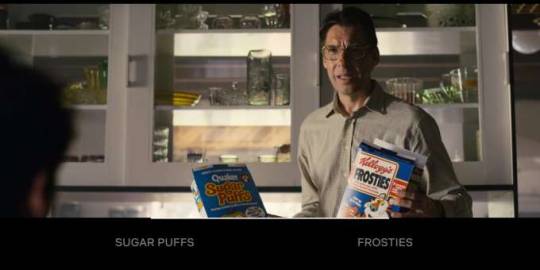
Messages and their meanings are reliant on the way they are interpreted by the receiver. Due to textual language lacking socioemotional expressions (thank god for voice notes) it is purely down to the receiver in how they then choose to reply. Whether the message be sympathetic or sarcastic, the outcome can be catastrophic if read incorrectly, hence the importance of face to face conversations. Hyper personal receivers are more likely interpret messages sent to them most suitable to their situations or assumptively depending on how well they know the sender. It is easy for someone to read a text in a manner that is appropriate to the purpose of the conversation at hand. Boyfriend annoying you? Great, reply with a sarcastic remark, it’s the easiest format of achieving that extra attention you wanted in the first place. The power of the receiver outweighs the purpose of the original message. Why? Because you determine the outcome based on how it’s read.
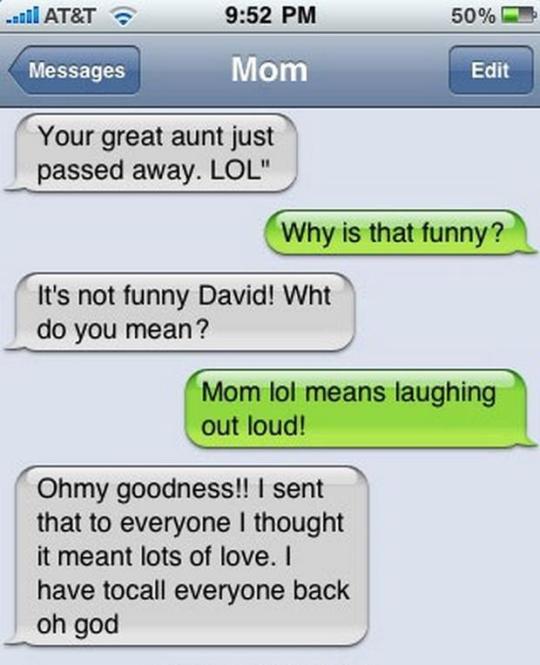
Online, we are able to create any persona we desire. It is no secret that people online are more boisterous and confident when expressing their feelings whether this be through a Facebook status, YouTube video or even a message to a group chat. Behind a screen, people evoke the persona of a keyboard warrior. It is easier for someone online to voice a derogatory or controversial opinion about someone or something without having to consider the repercussions if that person is upset by it. The dangers of online language entails the toxicity of being able to hide behind a screen and not having to deal with real people at face to face value. You don’t have to deal with emotions or anything else relating the a real humans actual feelings due to the overall absence of personal richness.
Hyper personal communications are more desirable, nowadays, online. Fact. Whether this be due to the decline in social skills and the fact that we have grown up in world where it’s more acceptable to add the new girl in our class on Facebook rather than to introduce ourselves in person, or whether it’s caused by the increase in our online groups to construct choices we should be strong enough to make on our own. The truth is, face to face communication is a dying cause and it’s only a matter of time before we lose the art of conversation due to the time and effort we put into perfecting our online personas rather than our real ones.
3 notes
·
View notes
Text
The problem with Magic: the Gathering no one is talking about | The Daily Dot
Two weekends ago, Magic: the Gatherings Pro Tour, the seasonal capstone of its organized-play system, kicked off in Madrid. The decks were creative and diverse, the matches were strategically interesting, and the new cards were sweetat least to people that already really, really like Magic cards. When the climactic last round before the playoffs went down, only 27,000 people were watching, andfull disclosureI wasnt one of them, despite being a hardcore Magic player in the past.
On the same Sunday the most recent Pro Tour wrapped up, Wizards of the Coast, the Hasbro subsidiary that makes Magic, announced itd be cutting benefits to Magics top competitive players by some $11,000 per player per year. By Monday, a backlash had begun among some of the biggest voices within Magic, and the following Tuesday, Wizards relented, pledging to restore the funding for next year.
Behind the numbers and the news, however, theres an even bigger problem that no one is addressing: Magic is a bad spectator game, and to truly save the Pro Tour, Hasbro might have to kill it first.
Magic: the Gathering is an enormous commercial success; its annual revenue, upwards of $300 million, is greater than Counter-Strike: Global Offensive and Dota 2 combined. However, Magic is a game from a different era, and nowhere is this more evident than its system of organized play.
Theres an even bigger problem that no one is addressing:Magicis a bad spectator game.
The Magic Pro Tour, which has existed since 1996, has been overshadowed by esports, whose prize pools regularly exceed the Pro Tours modest $250,000 purse. Magic is somewhere around the 30th-most popular offering on Twitch.tv, and it is hemorrhaging market share to Hearthstone, whose revenue roughly matches Magics $300 million a year and whose rank on Twitch is usually number two.
The Magic Pro Tour, saddled with small prize pools, low production values, weak commentary, illegible cards, and a game thats difficult to follow, appeals only to a narrow audience. If its top-tier tournaments appealed to a broader audience, Magic could be much, much bigger. To do so, Magic will have to implement some drastic changes.
Over the last few months, these changes have been set in motion. Though Magic has been growing by some 30 percent a year for the last six years, Hasbro announced in April that Wizards was switching CEOs, from Greg Leeds, an international marketing executive, to Chris Cocks, a sales guy from Microsoft. That followed another announcement from the head of all Hasbro, Brian Goldner, extolling the digital ecosystem, branding through storytelling, and a product called Magic Digital Next, to be released in the next few years. On top of that, at Hasbros 2016 investor day, the company called Magic a top 5 esports brand.
The last announcement was surprising for two reasons: Its untrue, and Hasbro has, since around 2007, been loath to spend any money on promoting competitive Magic. Magic pays its pros very little to do something very hard, and in this context, taking away $11,000 from Magics top players looks like yet more shortsighted cost-cutting. This is the prevailing interpretation among Magic players, who are right when they add that Hasbro would benefit hugely from professional Magic being a real thing. The problem is that Hasbro and Magic players have completely different ideas about what the competitive future of the game actually looks like.
Wizards original pay-cut announcement explained itself like so: The appearance fees we awarded for Platinum pros were meant to assist in maintaining the professional Magic players lifestyle; upon scrupulous evaluation, we believe that the program is not succeeding at this goal. Well, who would disagree with that? Magic doesnt grant its pros a living wage. The recent Magic documentary Enter the Battlefield stars two top players who live with their parentsnot a great incentive for players aspiring to be the best in the world.
Magicpros are, with a few exceptions, not the people Hasbro wants representing its brand.
This is crazy, because Magic makes its owners a ton of money, and there have been calls for a steep raise for the pros for over a decade. Indeed, later in the pay-cut announcement, Wizards revealed the Magic World Championship purse would increase from $150,000 last year to $250,000 this year, then $500,000 in 2017. Hasbro has a lot of cash to throw around, and creating a real professional class, via larger prizes and appearance fees, wouldnt cost much more in the grand scheme of things. So why not do it now?
Its simple: That wouldnt address the real issue. Very few people watch Magic. More than million tuned in for Dota 2 during the International, by contrast, and roughly 100,000 tune in regularly to watch Hearthstone on Twitch. And judging by its continuous attempts to defund the Pro Tour and marginalize the pros, Hasbro must think part of the problem is the current cohort of Magic pros. In Hasbros eyes, the current Magic pros have demonstrated a willingness to work for little money and few professional prospects, and they lead a lifestyle few would envy. If your final goal with organized play is to attract stars and engage a broader audience, then youre acknowledging the current crop of pros youve hired and retained, at a lower rate, is part of the problem.
Its true that a steep raise today would help legitimize Magic and improve the lives of the pros, who deserve it. But it wouldnt change the fact that Magic pros are, with a few exceptions, not the people Hasbro wants representing its brand. Under Leeds and Goldner, Magic achieved its high growth rate by moving its branding towards storytelling and resonance, and away from the pros. To casual players, the faces of the game arent Owen Turtenwald and Gerry Thompson; theyre the in-game characters Jace and Chandra.
For the most part, the pros are hardcore gamers, a holdover from a previous, less populist era of gaming. Comparing Magic pros social-media followings, streaming incomes, and cross-brand appeal with top esports competitors, its clear almost all of them struggle to attract mainstream viewers. Magics Pro Tour, which puts its competitors through a grueling schedule, doesnt even cater lunch, and draws an audience of hardcore Magic gamers only, faces the same problem.
Greg Leeds once tried to eliminate the Pro Tour entirely, but he was rebuffed by Magic R&D. Im guessing Chris Cocks will be more persistentand Magic R&D, already subordinate to Magic branding, will be brought further under control.
To call Magic a bad spectator game isnt a knock on the design. Even though I dont play much anymore, its still my favorite game, ever. Plus, it came out in 1993, and no one knew itd be important to appeal to huge digital audiences decades down the line. But Magic also has a bunch of weird timing rules that are delightful to junkies like me and baffling to the casual viewers Hasbro wants. Magic has over 13,000 unique cards; Hearthstone has under 1,000. To succeed as an esport, Magic will have to be radically simplified.
This sounds more difficult than it really is, and Magic Digital Nextwhich Goldner described as a new digital experience leveraging contemporary technology to create a seamless digital experience that meets all the players needs from new players to pro playersis likely to be Hasbros first attempt at making a modernized, simplified Magic.
To succeed as an esport,Magicwill have to be radically simplified.
The digital platform can not only give the brand a distinct identity from paper cardsit also has many advantages over them. With Magic Digital Next, Wizards could stop worrying about card stores, gambling laws, and a secondary market thats profitable for barely anyone. Paper cards are expensive: With a digitized Magic, casual players could be engaged and retained without having to spend fabulous sums just to play. The whole catalog of old, archaic, or confusing cards could be cut at once. Game-design mistakes could be retracted or revised. Cheating could be contained. Short animations could tell the story of the game to a casual audience.
And almost anything would be a better story than whats currently being told by the Pro Tour, which draws a tiny audience, or the small-print cards and buggy interface of Magic Online streams.
No one knows how the story of Magics overhaul ends. My best guess is that the game will exist both as a simplified Magic Digital Next and as a traditional paper product. Though the paper product will still be supported, allowing collections to retain value and addicts to justify spending the huge per-capita sums that make Magic so profitable, the digital will quickly outgrow the paper.
A big part of this will be competitive play, which will be conducted over Magic Digital Nexts pleasing new client. This will let streamers make a living catering to mainstream audiences. Hasbro will then increase spending on premier Magic events from $500,000 to $1 million and beyond, since doing so will actually attract a larger viewership, as well as premier gaming talent. And Magic will at last grow beyond a niche audience and afford its representatives a decent living, which will grow the audience, which will increase the prizes, which will grow the audience. And so on.
Of course, the plan could fail. It necessitates drastic changes in gameplay and personnel, which will take time and money. But Magic, which has been drifting towards making these moves for the last six years, isnt that far behind: Its prizes and revenue are on par with Hearthstones. And, though Hearthstone is a formidable competitor, with big events and stars of its own, all the pieces are in place for Magic. Its already a great game, with many skilled designers, a long history of profitability and innovation, and a handful of players whose cross-cultural appeal would be right at home in the esports world.
The exciting thing is that Magics barely begun to tap its potential. If Magics revenue can exceed $300 million with peak viewerships of 27,000, how big will it be when it monetizes digital platforms like Clash Royale, harnesses elegant watchability like Hearthstone, and draws real esports audiences?
In the words of Wizards founder, Peter Adkison, the Magic Pro Tour was created 20 years ago as a lifestyle opportunity for a young generation of Magic players to be professionals. This vision has been lost. But if Magic becomes an esport, it could once again be realized.
CML, a freelancer in Seattle, has written for Gawker, the Seattle Weekly, and several other publications. He maintains a website at cmlwrites.com and a Twitter at @CMLisawesome.
Read more: http://ift.tt/2oAjDj3
from The problem with Magic: the Gathering no one is talking about | The Daily Dot
0 notes